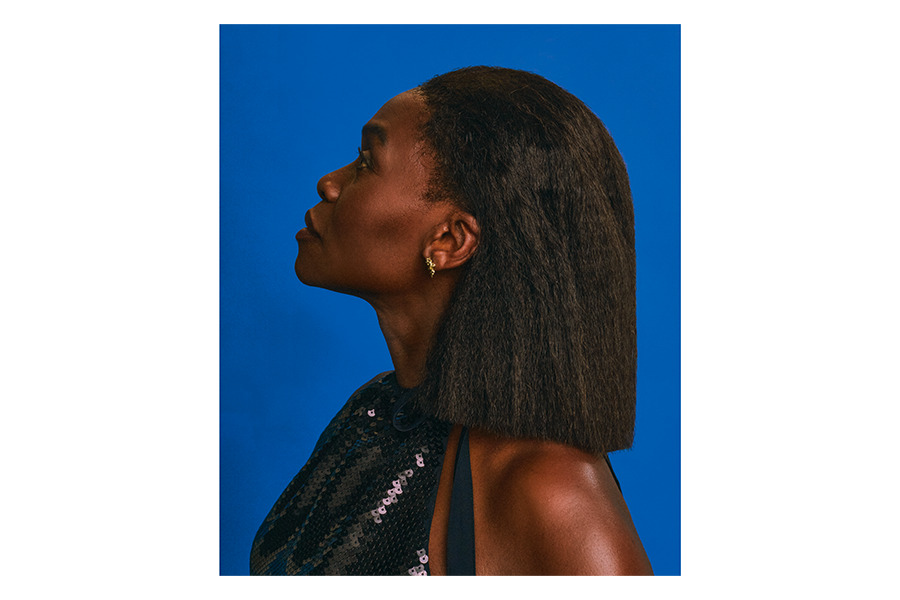Ahead of her role in the second series of The Pact, BAFTA winner Rakie Ayola talks confusing casting decisions, her desire for diversity and the enormous privilege of choice, and explains why she’ll always love London, warts and all.
Photography by Ejatu Shaw | Styling by Deborah Latouche | Hair by Kieron Lavine | Make up by Michelle Leandra
There’s likely to be some confusion around Rakie Ayola’s lead role in the upcoming second series of The Pact. “In series one I played a detective called Helen Holland, and in series two I play Christine Rhys who is this social worker,” she explains. “She has four grown up children, one of whom dies shortly before we enter the story. Someone turns up and turns the family’s lives upside down. And from there we launch into quite a dark, Gothic journey through six episodes… I think Pete McTighe, who wrote the series, had always had in mind that series two would be a different pact amongst a different group of characters. And so, it has come to pass that that is the case.”
This in itself is not unusual; Kay Mellor’s The Syndicate told the story of the fortunes of a different lottery syndicate over each of four series. What is more unusual is to use the same actress to portray different characters in consecutive series. “People see the same face a lot in different things, and they just go with it. And they might well think, oh, I loved Olivia Colman in Broadchurch, but then they don’t, when they are watching The Crown, go, oh, well I don’t know if I can get into this now,” Rakie says, justifying the choice. “What Pete and Little Door Productions are saying is, look, these are actors, and here is an actor who we wanted to work with again. And she is local, and she has so many similarities with this character, that we thought, let’s just cast this actor again, because we think she can do this job.”
She does admit that the set up may not be immediately clear to viewers, though. “When we were filming, drivers would say, ‘So, tell me again, you’re not the detective?’ And even quite recently I was doing a photo shoot and the designer on that said, ‘Oh yeah, I loved the first series…’ and then I had to explain, and then she was sort of scratching her head. So, yes, there might be some confusion – maybe for ten minutes, people will go, ‘Is she? Oh no, she’s not the detective…’ And then they will just follow it through.”
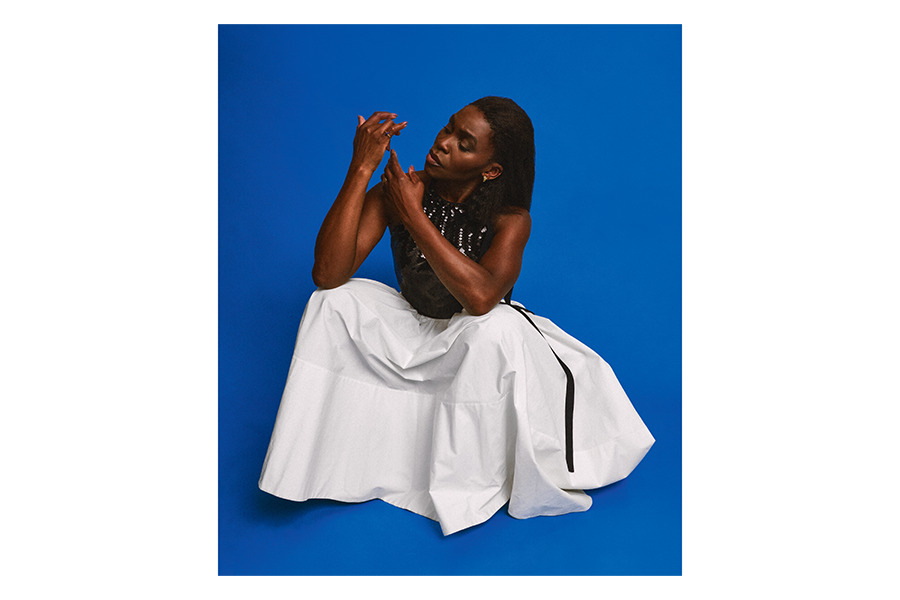
Rakie wears: dress, archive Calvin Klein (vestiairecollective.com); shoes (michaelkors.co.uk); earrings (therockhound.com)
Explaining how the role came about, Rakie says: “Pete and I got on really, really well. And we were talking a lot after The Pact series one came out and looking at projects that we might do together. And then Little Door got recommissioned for a second series, so I thought, oh, I won’t hear from him for a little while now because he’ll be busy putting that into action. And then, after not talking for several weeks, he got in touch and said that he would love for me to read the script…” She read it and loved it, and the rest, as they say, is history.
For Rakie, that feeling of connection to a script is very important, and, with over 30 years’ acting experience on her CV, a vast and varied body of both stage and screen work to her name and a BAFTA award, she considers herself to be in a very fortunate position to be able to take things like this into consideration when accepting a role. “I have been doing this for a long time. There is a level of work that I am introduced to because of that. So, sometimes I get a script and my agent asks if I want to send in a self-tape for it. Sometimes it’s an offer, but most of the time I am doing self-tapes with everyone else. But now I find I am in a place where I can go, ‘You know what, I love this script, I will definitely watch this show, but I have no desire to play that part at all, so thank them for thinking of me, but I’m not going to send anything in’.”
She acknowledges that she is in a very privileged position to be able to make decisions like this. “When you are not in that position, every script you get is like gold and you will jump as high as you need to,” she agrees. “Recently there was an offer from a prestigious theatre company in London. And it was a straight offer. But I said that I had been really busy and hadn’t spent enough time with my family, and I was going to shut up shop and go on holiday. And they were even willing to accommodate that. But I said, no, because it would mean that all through the holiday, I would be learning lines, and those three weeks just needed to be about my husband and my children. And I had never worked with this theatre before, and I loved the script, but the answer was: ‘No thank you, but I would love to come and see it’.”
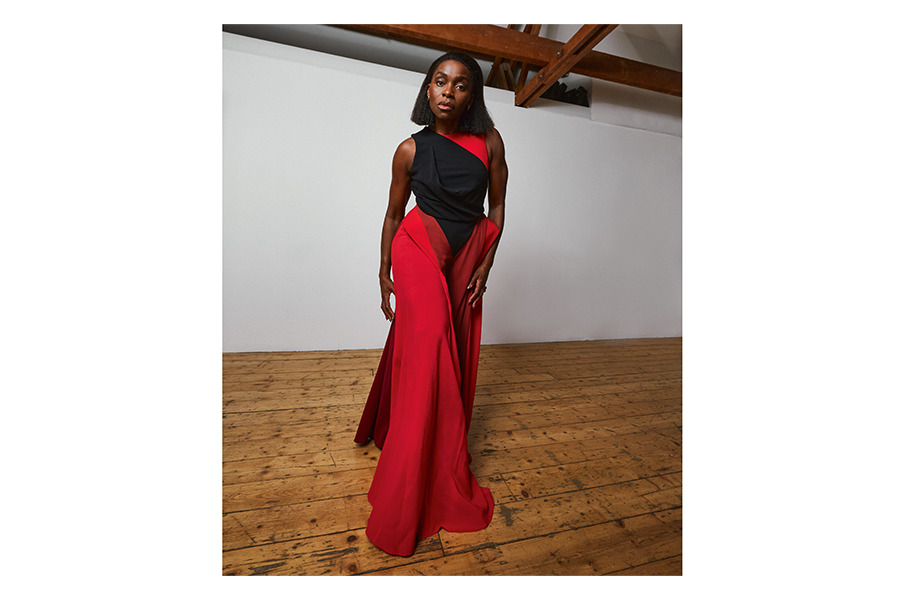
Rakie wears: jumpsuit (cimone.co.uk); ring and earrings (therockhound.com)
When it came to the part in the first series of The Pact, it was just a single line of dialogue that made the project irresistible to Rakie upon first reading the script. “In episode one, Helen says to Jason Hughes’ character something like: ‘Do you like owls? I can’t stand ’em… Beady fuckers’ she recalls. “As soon as I read that, I thought, I want to play the woman who says that. I just loved that Pete had written that in. I loved it so much. And I said that to him, and I said that if he had tried to cut that line, I would have walked!” She laughs.
For this second series, Rakie also took on the role of executive producer. “It often happens that you come on as a lead actor and you get this exec producer role, which you can choose to completely ignore,” she explains. “So, you can have the title, and do nothing different and just do your job as an actor, which is allowed. Or you can decide to get stuck in. And I really wanted to get stuck in.”
There were, she tells me, several reasons behind that wish to get stuck in. One was a desire to be involved with the decisions made by the art director ahead of shooting. “They had found this beautiful house that Christine lives in,” she tells me. “But I was like, OK, let’s talk about how that house is decorated. Let’s have a conversation about it, so that when I get there it feels like a house that the person who I am trying to create would live in. As an actor, sometimes that doesn’t happen – you turn up, and absolutely all of the decisions have been made, and you think, there is absolutely nothing about this house that marries with the person I have been working on! And that can be quite tricky.”
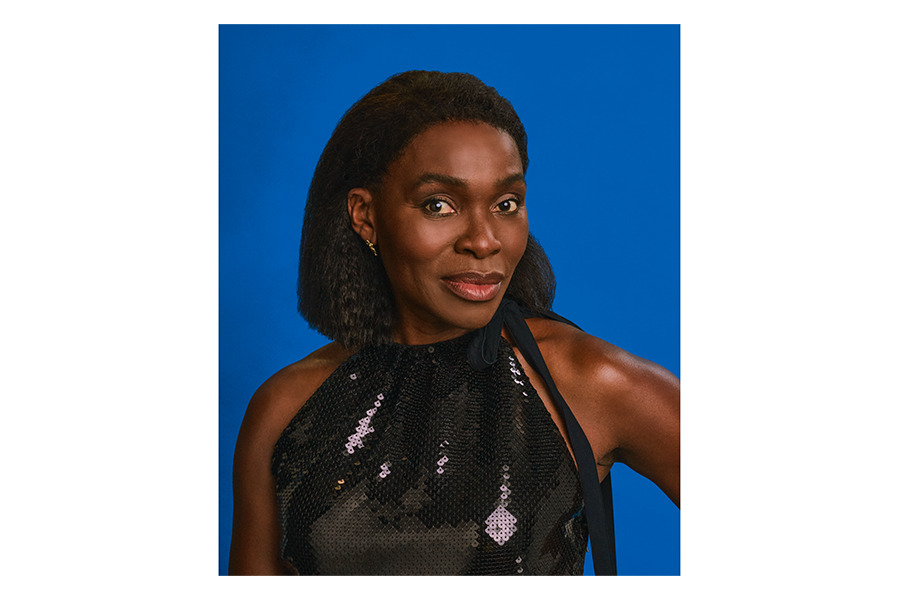
Beyond that, the appeal of the role came once shooting had begun. “For me, being an exec really came into its own when we were on set,” she recalls. “We had a lot of trainees who had come in through their access route – people who had never been on a set. It was a very vibrant set, a busy set, and I didn’t want us to send them away not having learnt anything. So, I found that I could really spend time with them. Sitting down with people between takes and just understanding what they had learnt. I could do that as an exec, but as an actor, you’re just a nosey parker!” She laughs.
Indeed, it was as much a learning experience for Rakie as it was for the trainees. “I was learning, and I was excited by what I was learning,” she tells me. “Because maybe we are a job short in the industry. Maybe what we need is that teacher – somebody who wanders around the set and teaches stuff. Makes sure that people are learning, and then holds on to them when they leave, so that they have a sort of contact. So that it’s not just like you cut your teeth and then you are never allowed in again because you are not new anymore, but you don’t know enough for anybody to actually hire you. I kept saying to people, keep talking to me, keep in touch. Make sure that you come out of here with some kind of reference.”
The need to ensure that her industry is accessible to everybody is something Rakie has spoken of a great deal, talking particularly passionately about diversity both within productions and behind the scenes. “Representation matters, and it matters across the board, but not just in terms of ethnicity and skin colour, but economically and socially too,” she tells me. “I am a Black woman who grew up on a council estate in Cardiff, and all my friends from high school and primary school, a lot of them still live in that same council estate in Cardiff. I am very aware when I am in a situation where I am surrounded by people who not only don’t look like me but are different in so many ways…”
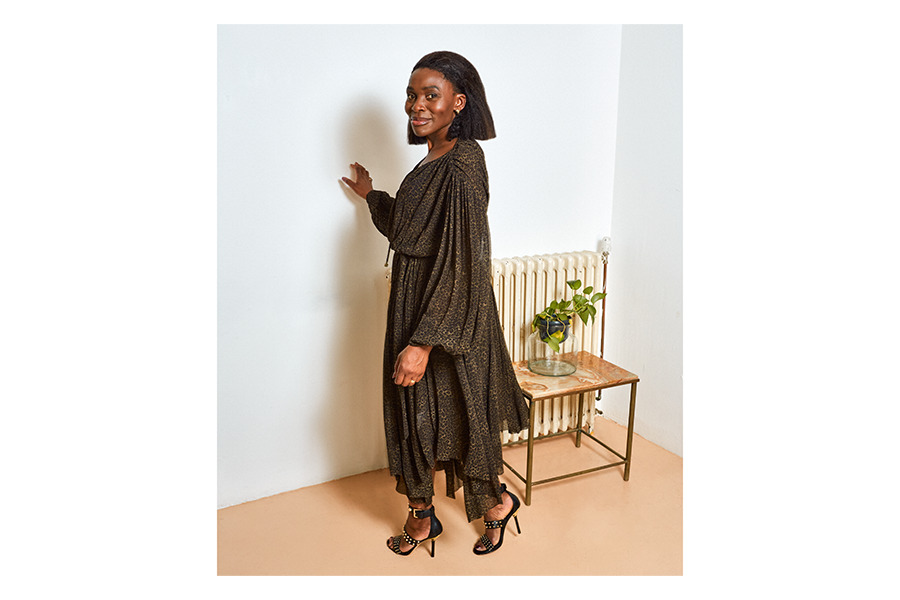
Rakie wears: dress and shoes (michaelkors.co.uk); ring and earrings (therockhound.com)
It is not unusual for those wanting to get a foot on the ladder with a career in film and television to be expected to work for free to gain experience. “So many people come into the industry getting paid nothing in order to make contacts, they are living off mum and dad. And if mum and dad are able to keep you, that means you come from a certain demographic,” Rakie explains. “But with various access routes available to youngsters now, we are miles ahead of where we were when I first started. Miles ahead…”
There is still work to be done though, Rakie believes. And part of that is about making people more aware of the opportunities available in the industry, from carpentry to accountancy. “We need to go out there, and just say, chances are that whatever the thing is that you want to do, you can use those skills, we can use those skills in TV and film production,” she tells me. “We are saying that we want people to know what is possible, so that if they have a skill we can use, we want them to know that they are allowed in. It is OK. A lot of work still needs to happen, but it is changing all the time. And every time I go onto a set, I go, ah, yeah, OK, there are definitely more women here, and they are definitely not all in the make up department. And that is great to see. But yeah, the social thing – hearing more accents would be nice. Hearing more accents from around the country would be good.”
From diversity on set, our conversation moves on to the diversity in the community, here in London. Brought up in Wales, Rakie has lived in the Capital for many years, and it is this, she says, that has kept her here for so long. “My street right, I was thinking about this recently,” she tells me. “The people next door are from Nepal, and they are Hindu; and then next to them they are Polish; and next to them is Lin, and she is Chinese; and then there’s somebody who is Sikh; and then we have got Terry who is born and bred London; and we have a French Senegalese couple who are fantastic; Kemi, who is Nigerian… That is my street. And I love that. I absolutely love it. And I would miss that. That is the reason that we haven’t moved out – because we would miss that.”
Though her feelings for London, as with all love affairs, are complicated. “I love London, even when it infuriates me. You know, when I see the shopping trolleys, and the rubbish. Oh, don’t get me started on the rubbish… It breaks my heart that people just don’t care,” she exclaims. “I am the person who walks around her street picking up rubbish, I kid you not. A lot of people say that’s virtue signalling, which I don’t give a shit about, I’ll virtue signal all the way if it is helping. I pick up the rubbish because I cannot bear to see it; it is easier for me to pick it up, than to keep seeing it and it hurting my insides. I will even pick up somebody else’s dog mess rather than just keep stepping over it. That aspect of anywhere drives me crazy, but I do love London. The four of us were on the Clipper travelling down to Greenwich the other day, and we stood outside, and I thought, oh, God, it is beautiful this city. It is absolutely beautiful. For all the nonsense, it is beautiful, you know?” I couldn’t agree more.
The Pact is on BBC One this month
